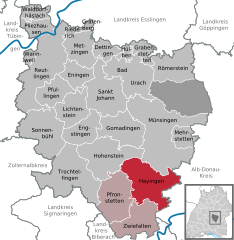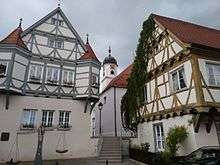Hayingen
| Hayingen | ||
|---|---|---|
| ||
 Hayingen | ||
Location of Hayingen within Reutlingen district 
 | ||
| Coordinates: 48°16′31″N 09°28′41″E / 48.27528°N 9.47806°ECoordinates: 48°16′31″N 09°28′41″E / 48.27528°N 9.47806°E | ||
| Country | Germany | |
| State | Baden-Württemberg | |
| Admin. region | Tübingen | |
| District | Reutlingen | |
| Government | ||
| • Mayor | Kevin Dorner | |
| Area | ||
| • Total | 63.31 km2 (24.44 sq mi) | |
| Population (2015-12-31)[1] | ||
| • Total | 2,206 | |
| • Density | 35/km2 (90/sq mi) | |
| Time zone | CET/CEST (UTC+1/+2) | |
| Postal codes | 72534 | |
| Dialling codes | 07386 | |
| Vehicle registration | RT | |
| Website | www.hayingen.de | |
Hayingen is a town in the district of Reutlingen, in Baden-Württemberg, Germany. It is situated 32 km southeast of Reutlingen.
Neighboring communities
The following cities and municipalities border on the city Hayingen, they are in a clockwise direction starting called the north and part of the district of Reutlingen or the Alb-Donau-Kreis ¹ Münsingen , Ehingen ¹, Emeringen ¹, Zwiefalten , Pfronstetten and Hohenstein . Constituent For Hayingen with its districts Anhausen, Ehestetten, Indelhausen and Münzdorf except the main town Hayingen include 13 more villages, hamlets and farms.
See also: List of places in the district of Reutlingen
In the city there are several proofs of former , no more existing today settlements; the 1208 and 1217 Altmanshusen mentioned as Altmannishusin settlement Altmann Hausen. Altmann Hausen was in possession of the monastery Salem and was in 1329 at the stadium sold. 1437 the place was uninhabited; the 817 as Polstetin and 1208 mentioned as Bolstetin Bolstetten went on in Altmann Hausen, as well as the 1268, when Horne / Uffenhorn Horn, which was at that time owned by the monastery Salem. Also in possession of the monastery Salem, the 1208 mentioned as Wilervelt Weiler field and 1282 mentioned as oppidum Wineden winds were (all in Anhausen District); the two places Ettenheim and 1364 mentioned as Pflumersbuch Pflummersbuch in Ehestetten district; the proofs of former after 1329 Homestead Baldenstein, the place Bühlenfingen, and mentioned around 1100 settlements Leimgrube (as loco Leimgrube) Maisinhart (as Maisinhart), Bad book (as Slehtinbuch) Wildberg (as Wildisberc) the 1523 called Steinhausen (Stünhuser field) and of 1208 mentioned as Vainhusen place Vainhausen. Vainhausen was owned by the monastery Heiligkreuztal , later owned by the monastery Zwiefalten and came off in the 15th century (all in Hayingen district). [2] North of Münzdorf are the remains of the hilltop castle Burgweiler .
Air
Hayingen is a health resort in the Swabian Alb.

Old town of Hayingen
Lunch break in Hayingen during WWII
The first written record comes as Hayinger Mark in From the year 756 Lorsch codex . The Knights Swigger of Gundelfingen founded probably in 1276 the city. Because of Reichsdeputationshauptschluss Losing Hayingen came under the media coverage of the Principality of Fürstenberg to the Kingdom of Württemberg . There, the city belonged to the upper office Münsingen and later the district Münsingen . After its dissolution within the district reform was the 1973 district Reutlingen slammed.
Religions
Due to the membership of the city's Fürstenberger possessions Hayingen remained even after the Reformation Catholic. Even today there are four Roman Catholic churches for deanery Reutlingen-Zwiefalten belong. Since 1884 there have been in Hayingen a branch of the Protestant parish Zwiefalten . The parish Hayingen in 1953 independently, because they after the Second World War due to the influx of displaced persons had grown considerably and now also possessed its own church building.
Population Development
The population figures are census results (¹) or official updates the State Statistical Office (only primary residences ). year Population figures
- December 1, 1871 ¹ 1,806
- December 1, 1900 ¹ 1,600
- December 1, 1925 ¹ 1,519
- May 17, 1939 ¹ 1,380
- September 13, 1950 ¹ 1,656
- 6 June 1961 ¹ 1,849
- May 27, 1970 ¹ 2,114
- May 25, 1987 ¹ 2,034
- December 31, 1990 2,125
- December 31, 1995 2,164
- December 31, 2000 2,149
- December 31, 2005 2,224
- December 31, 2010 2,127
- December 31, 2011 2,129
Council
The council has 14 members Hayingen. The local elections on 25 May 2014 led to the following official results. The turnout was 73.00% (2009: 72.71%). The council consists of the elected honorary councilors and the mayor as chairman. The mayor is entitled to vote in the municipal council.
Free Voters Association (FWV) 40.9% 6 seats (2009: 38.1%, 5 seats) Christian Democratic Union (CDU) 39.1% 5 seats (2009: 36.2%, 5 seats) New Citizens List (NB) 20.0% 3 seats (2009: 25.7%, 4 seats)
